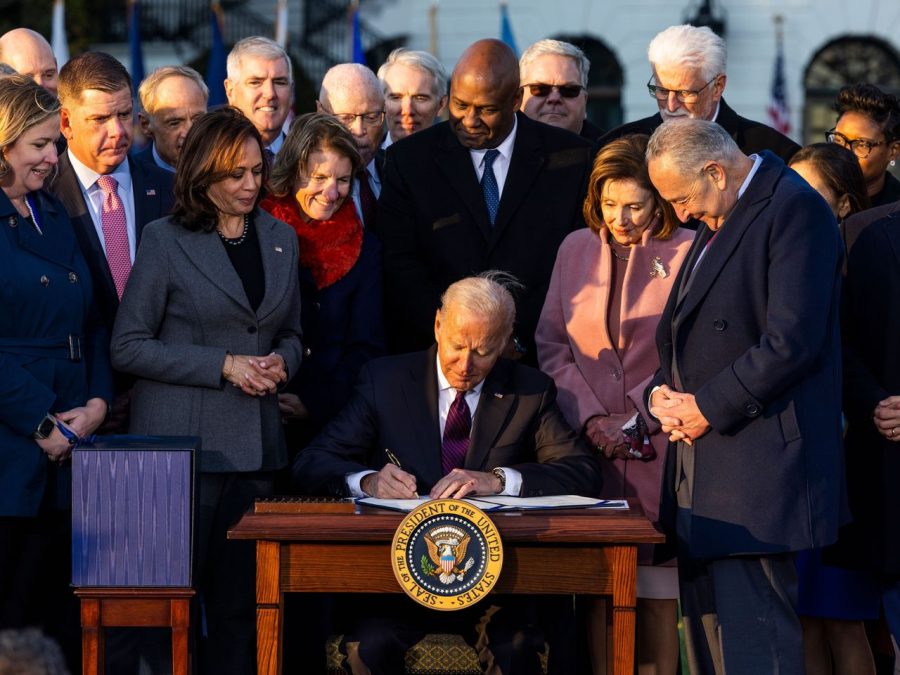Trump’s infrastructure tirades are hypocritical
Donald Trump positions himself against the advancement of nation’s faltering infrastructure
President Biden signs the infrastructure bill into law at the White House on Nov. 15. The bill will introduce sweeping changes to the nation’s transportation systems. –
December 2, 2021
In August of this year, former President Donald Trump announced his opposition to President Joe Biden’s $1 trillion infrastructure bill, threatening to withhold support from any GOP senator who supported the bill.
“Joe Biden’s infrastructure bill will be used against the Republican Party in the upcoming elections in 2022 and 2024, Trump said in a statement, “It will be very hard for me to endorse anyone foolish enough to vote in favor of this deal.”
In a procedural vote just hours after Trump issued his threat-ridden statement, eighteen GOP senators voted in favor of the bill. With the bill having been signed into law on Nov. 15 by President Biden, Trump’s criticism towards the Republican Party has persisted, now directed toward the nineteen Senate Republicans that voted to advance the infrastructure bill.
[Despite the former president’s disparaging comments, the infrastructure bill will actually provide a large amount of much-needed funding in the way of rehabilitating the nation’s crumbling infrastructure.] According to the White House, about 20% of the nation’s significant roads and highways and about 45,000 bridges are in poor condition. The bill dedicates about $150 million to fix these specific issues in what the White House has determined to be the largest dedicated bridge investment since the 1950s. Moreover, the bill contains efforts to improve both transportation safety and mitigate climate change.
Ironically, during his presidency, Trump’s policies indicated that he did actually recognize the need to upgrade the nation’s faltering infrastructure — he was just incapable of accomplishing this goal. A $1 trillion bill was amongst his campaign promises when he first ran for the presidency in 2016. Later, in 2019, he met with House Speaker Nancy Pelosi and then-Senate Minority Leader Chuck Schumer in order to discuss pursuing an overarching infrastructure plan. However, mere days after these negotiations, members of Trump’s own party (including his White House chief of staff and congressional Republicans) voiced their opposition to Trump’s plans, and the initiative began to falter. In a later bipartisan meeting with Democratic leaders, Trump stated that he would refuse to work with lawmakers investigating his own scandals, and stormed out when Pelosi informed him that his plan to build a giant border wall would not gain congressional backing. His attempts to blame his bill’s lack of progress on Democratic leaders was heavily undermined by the fact that he could not get his own party to support him, and despite conducting multiple “Infrastructure Weeks”, Trump was unable to make any significant headway in the pursuit of rehabilitating the nation’s infrastructure.
Yet, Trump continues to denigrate the infrastructure plan as formulated and passed by President Biden, heavily condemning the members of his party that facilitated the bill’s passage, particularly Senate Minority Leader Mitch McConnell.
“Why is it that ‘Old Crow Mitch McConnell’ voted for a terrible Democrat Socialist Infrastructure Plan, and induced others in his party to do likewise when he was incapable of getting a great infrastructure plan wanting to be put forward by me and the Republican Party?” Trump said in a statement. “All Republicans who voted for Democrat longevity should be ashamed of themselves.”
However, his comments have been surprisingly ineffective in swaying the GOP, instead eliciting critical recoil from Republican lawmakers toward the former President. Senator Kevin Cramer of North Dakota in particular, who had largely supported Trump, explicitly expressed his support for Biden’s infrastructure bill and disdain towards Trump’s attempts to halt the bill. In fact, Cramer highlighted a particularly significant nuance present throughout Trump’s condemnatory comments.
“He didn’t give one reason why it’s a bad deal, other than it’s Joe Biden’s [bill] … I think he’s wrong on this issue,” he said.
As a political figure that evidently understands the merits of a sweeping infrastructure bill and recognizes the bill’s necessity, Trump has positioned himself not only against Democrats but against any advancement of the nation in which Democrats have a hand. In fact, he took it one step further, denouncing members of his own party that aimed to work alongside their political rivals in order to rebuild America. Essentially, Trump has indicated that his priorities do not lie with the nation or even with the American people, but in impeding the efforts of his rivals as much as possible.
The precedent set by the former President, who is still widely supported — by two-thirds of all Republicans and Republican-leaning independents — is one of competition and polarization rather than one of cooperation and advancement. As a potential candidate for the 2024 presidential election, Trump’s apparent vision for the nation following these principles is, quite frankly, terrifying. Furthermore, his chances in a presidential election seem better than before. As of now, Biden’s approval rating sits at about 40%, making him one of the most unpopular presidents of all time at this point in a first term. Moreover, the way the gubernatorial elections in both Virginia and New Jersey transpired indicate a nationwide shift towards the GOP. Ultimately, if this shift continues and is permeated by Trump’s brand of partisanship, it could lead to the inauguration of a newer, more aggressive Trump administration in 2024.























